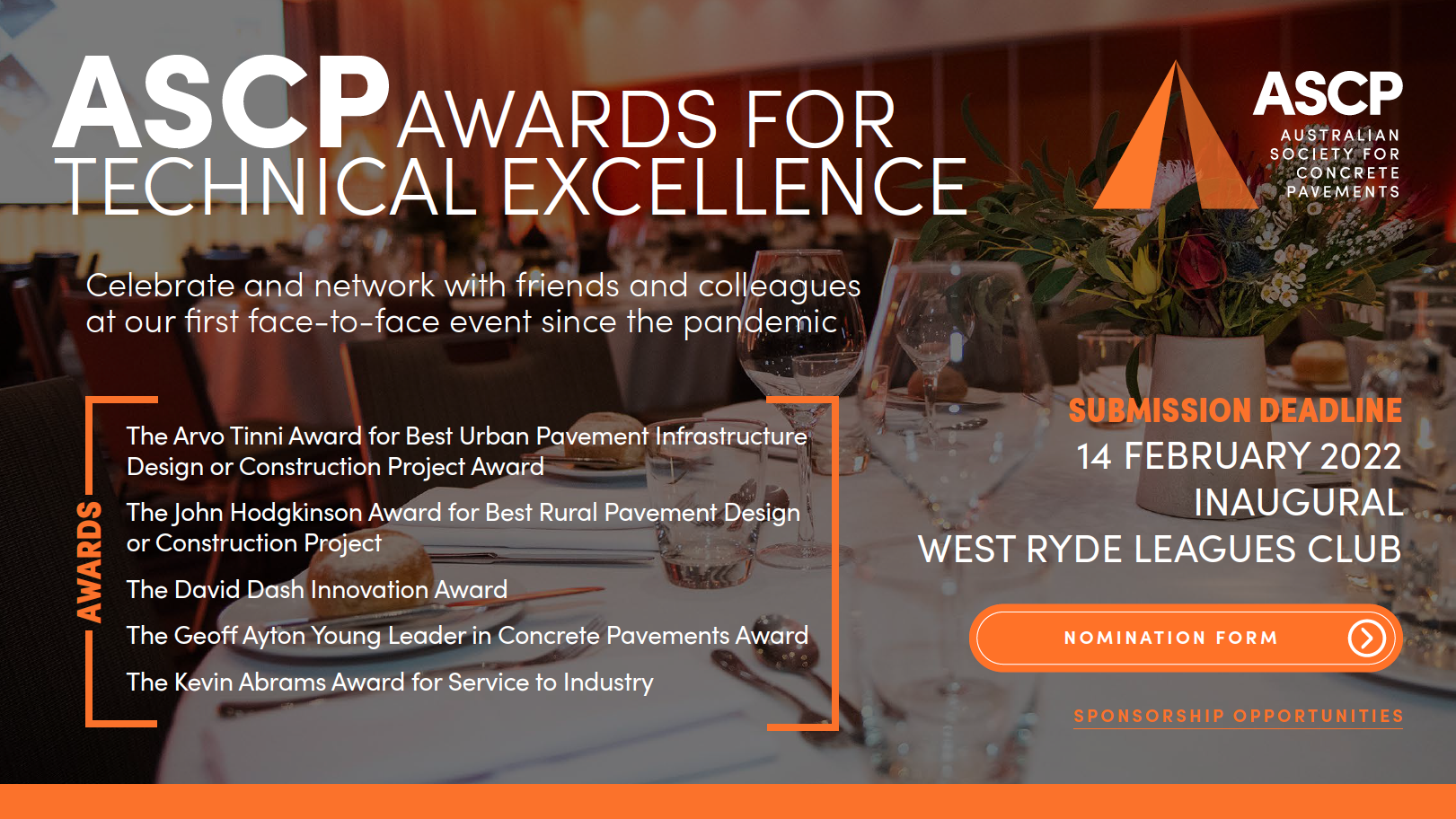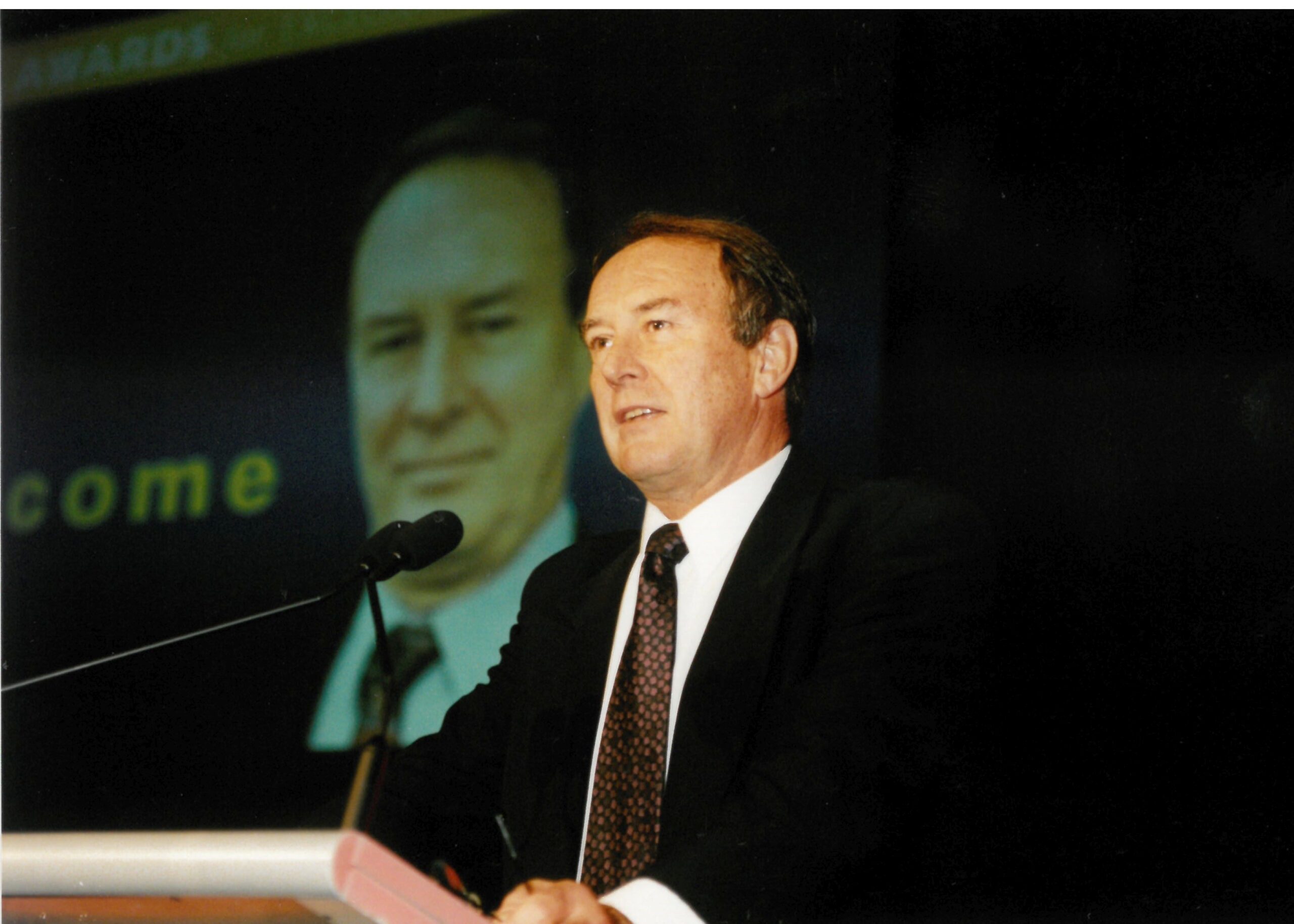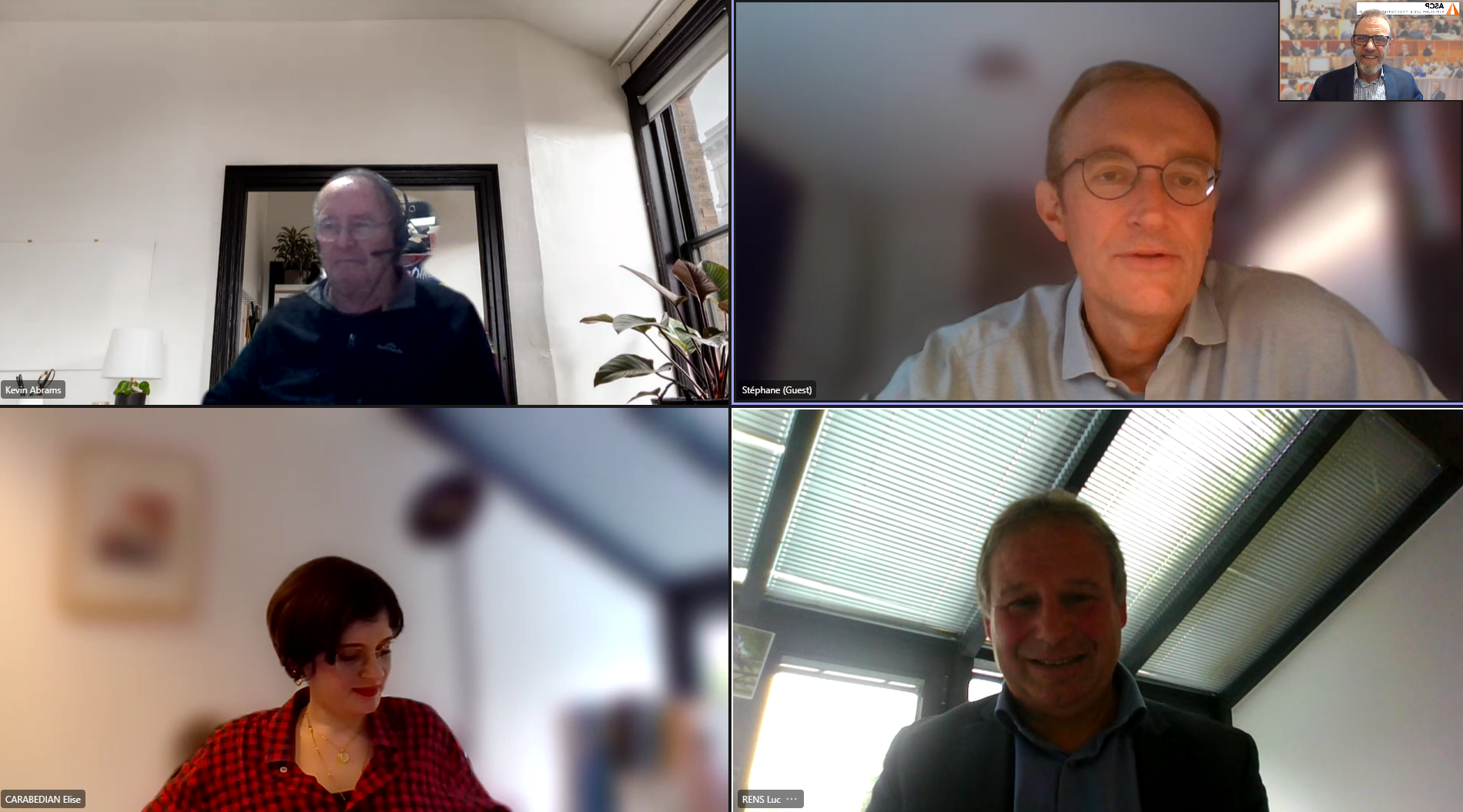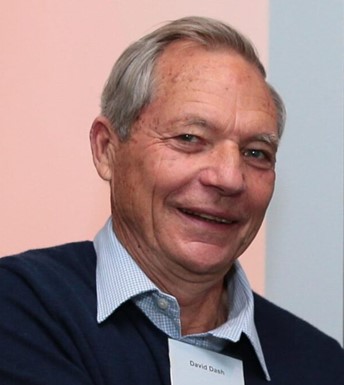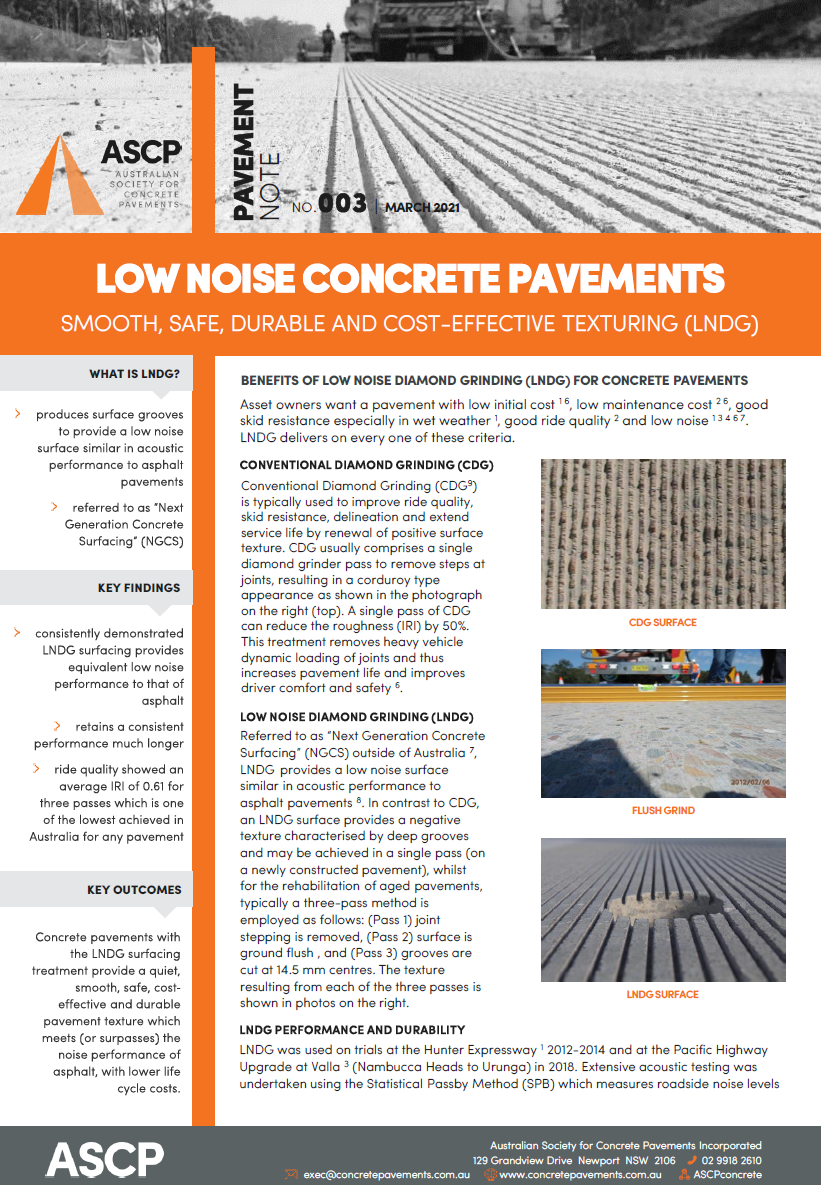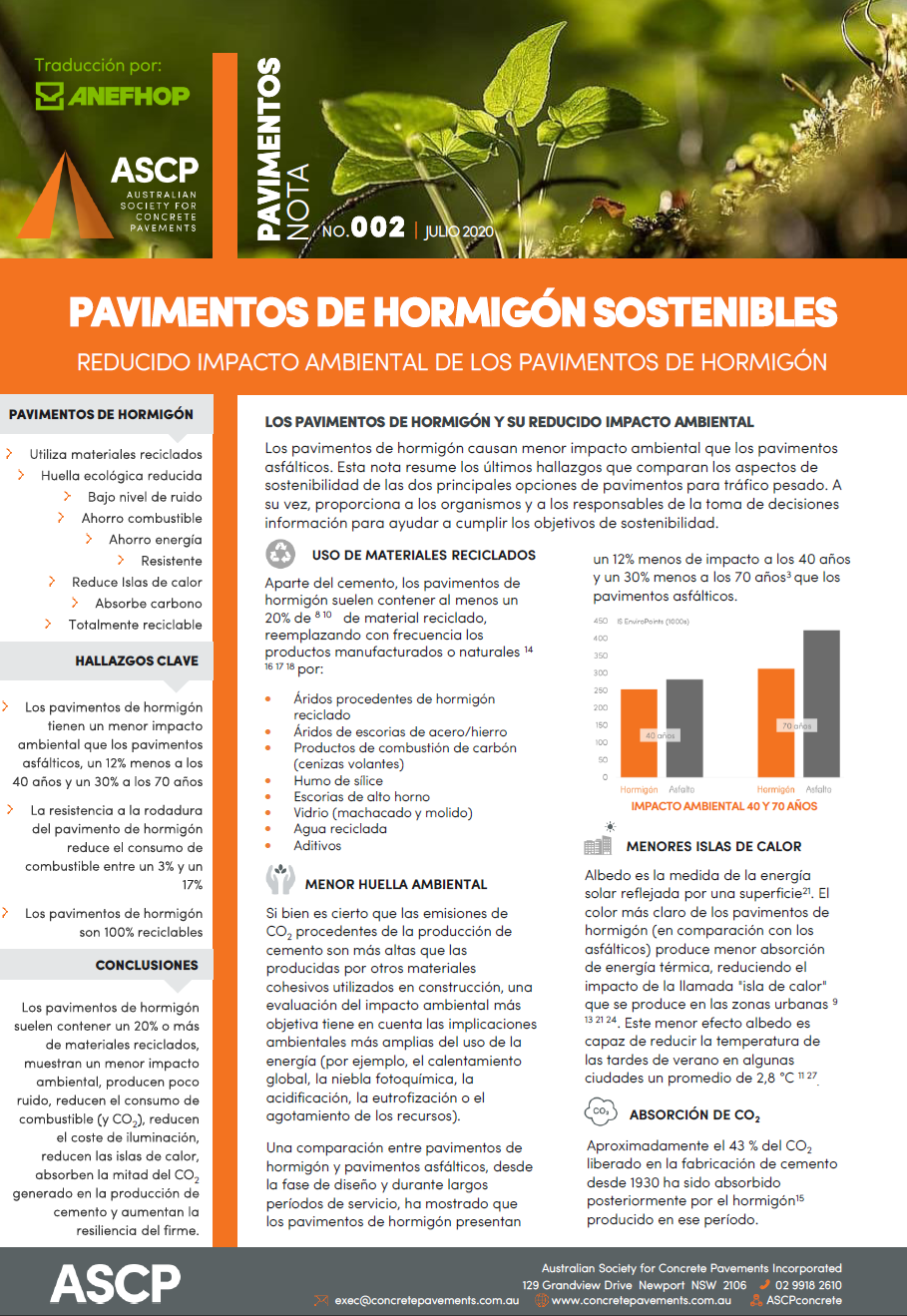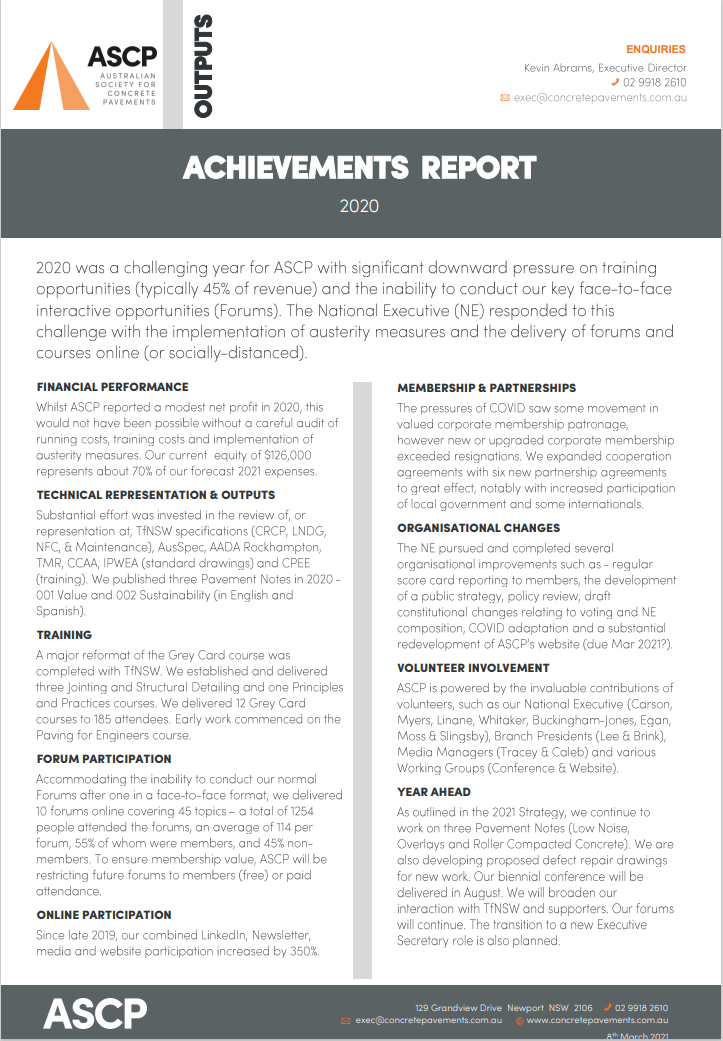AUS-SPEC is regularly invited to present papers at the IPWEA National and State Conferences on the AUS-SPEC document system for the life cycle management of community assets. These papers provide an overview of AUS-SPEC and guidance for use as well as direct access to Nandini Mehta‘s paper “Specifying Concrete Pavement for Local Government“
Feedback sought for TfNSW draft test method T279
Transport for NSW (TfNSW) Test Method Review Committee (TMRC) is currently revising T279 – Flow time and voids content of fine aggregate by flow cone. Members of the Australian Society for Concrete Pavements are invited to submit comments on the draft revised version.
Please use the comment form and send your feedback to the Australian Society for Concrete Pavements so we can consolidate feedback by COB Monday 31 January 2022.
This is a brief summary of the technical changes made:
- Added the manufacturing drawing for flow cone apparatus.
- Preparation revised to include determination of receiving can volume and reference to T105.
- Terminology updated from “oversize” to “material retained on the 4.75 mm sieve”.
Click here for link to the existing version of T279, Ed 2 Rev 0: https://roads-waterways.transport.nsw.gov.au/business-industry/partners-suppliers/documents/test-methods/t279.pdf
ASCP Awards For Technical Excellence — Call for Nominations
Australian Society for Concrete Pavements is hosting the inaugural Awards for Technical Excellence on the 1st March, 2022. The awards evening will be a combination of honouring a number of industry legends as well as acknowledging outstanding individuals and projects in the field. The Awards for Technical Excellence will be held in conjunction with our first Forum for 2022 which will be a face-to-face event — allowing members to reconnect and celebrate major projects.
The inaugural Awards categories are:
- Arvo Tinni Award for Best Urban Pavement Infrastructure Design or Construction Project
- John Hodgkinson Award for Best Rural Pavement Design or Construction Project
- David Dash Awards for Innovation
- Geoff Ayton Award for Young Leader in Concrete Pavements
- Kevin Abrams Award for Service to Industry
Nominations are are invited for each of the above categories. You can submit one or more nominations using the LINK HERE.
Submission deadline: 14 February 2022.
Sponsorship Opportunities
Craig Heidrich (and HBM Group) appointed as Executive Director ASCP 1st Nov 2021
HBM Group, following 12 months of intensive discussions with the Australian Society for Concrete Pavements (ASCP) National Executive, was appointed to manage the Secretariat functions of the
Society from 1st November 2021.
“HBM Group, being a professional association management company with more than 26 years of experience, is excited by the opportunity and trust placed in our organisation” said HBM Group Managing Director, Mr Craig Heidrich. “We are very much looking forward to working closely with the National Executive, Members and Industry Stakeholders to further the vision of the Australian Society for Concrete Pavements and its aims to facilitate improvements in the design, construction and quality of concrete pavements in Australia through education, training, technology transfer and research”.
The Australian Society for Concrete Pavements joins a stable of other HBM Group managed Associations such as; Ash Development Association of Australia, Australasian (iron & steel) Slag Association; Australasian Pozzolan Association; Amorphous Silica Association of Australia; Concrete Pumping Association of Australia and various connected HBM Group networks of; World Wide Coal Combustion Products Network; World of Iron and Steel Slag Network – all sharing a common connection with concrete.
Mr Heidrich said “HBM Group have big shoes to fill for the Society”. After 13 years of faithful management by the late Kevin Abrams, the Society is where it is today. HBM Group acknowledges the leadership, direction and generosity of Mr Abrams and the Board of Directors.
Establishment in 1995, HBM Group is committed to providing highly competent services in the field of association management. Our strengths are focused on industry advocacy, R&D management, policy development and membership. Driven by results and the characteristics of its unique clients
Kevin Abrams (1946 – 2021) A Tribute from Industry Colleagues and Friends
Vale Kevin Abrams Passed away 6 October 2021 – read by John Hodgkinson
To Louise and all of Kevin’s family; the privilege that has been given to his industry colleagues, far too numerous to mention, some are here, to be part of this Service for Kevin is gratefully acknowledged.
A few of us, such as Bob McKay, Denis Sullivan, David Slingsby, myself and some others had an association with Kevin going back to his DMR days in 1971, 50 years ago. A history of his professional life is being assembled and will be presented to the family.
Kevin graduated with 1st Class Honours from UNSW and then a Masters Degree at the same University. He later obtained an MBA degree from Macquarie University. He was always destined for great things.
He worked in both public and private sectors including Hornibrook and Pioneer Concrete. In the early 1970s he was an Engineer at the old DMR at its Offices at Thornleigh, Windsor and Holbrook. He later worked in the Engineers Branch of the Housing Commission. He was NSW Regional Engineer with the Cement and Concrete Association from 1985 to 1992. In 1994 he worked with Geoff Ayton at RTA to write the Concrete Roundabout Design Manual that remains the definitive text on that subject.
After being National General Manager for BST Australia, in 1994 he formed Abrams Marketing to market and distribute Lightweight Concrete Aggregate and other products and marketing services to the concrete construction industry.
When the Australian Society for Concrete Pavements was formed in 2007 he was the logical choice for Executive Director, a position he held continuously with distinction for 13 years until his passing. He led from the front providing both direction and mentoring. Through his efforts ASCP now has strong links to similar international bodies in USA and Europe and the Centre for Pavement Engineering Education based in Melbourne.
Between 2006 and 2016 Kevin provided a secretariat service for the Post-Tensioning Institute of Australia.
But it is Kevin’s association with the Concrete Institute of Australia where he arguably made his biggest impact. For that we are indebted to a catalogue of information on him provided by the Institute CEO David Millar and Honorary Member John Woodside.
In 1985 at CACA Kevin took on the role of CIA State Secretary until he left in1992. He remained on the Committee and was elected to the National Executive and then NSW Branch President in 1997. He was elected National Vice President and then National President in 2001.
He was Conference Secretary and then Chairman of the Organising Committees for the 1991 and 1999 Biennial Conferences in Sydney.
Kevin served as Convenor of the Membership Committee for twelve years with a huge influence on Institute membership benefits and activities.
I can do no better than the following quotes from David Millar in describing Kevin, the man.
“ Kevin championed the Awards for Excellence in Concrete for nearly two decades. As convenor of the Recognition of Excellence portfolio for well over 10 years he championed excellence and emphasis on adding prestige to the Institute’s Life & Honorary Memberships, and National Engineering Bursary. From 2019 he served as Chair of the judging panel for Awards for Excellence in Concrete. Through Kevin’s personal drive these are now recognised nationally, within the Institute and industry.”
“ After being made a Life Member of the Concrete Institute of Australia in 2005 he continued with the same passion and enthusiasm he had from day one.”
“Kevin has a wonderful way of embracing our history with a view to the future, balancing experience with change, and bringing together the old with the new. There is no-one who embodies the essence of the Concrete Institute of Australia more, nor better served to lead the CIA’s Golden Jubilee celebrations in 2020.”
Some other words submitted by colleagues;
“ Honest, hard-working, friendly, able to work with people at all levels, a really authentic person, caring, professional, humble, achiever, ethical, innovative, empathy, commitment, integrity, great company, good mate, the list goes on.”
He was a Member of a lunch group of former DMR concrete “old comrades” set up by the late Ed Haber that meets a few times each year to solve the world’s problems and to hear of Kevin’s latest exploits in cooking and at his bridge club, and his current preferred Scotch.
To Louise and Kevin’s other family members all that remains for me to say on behalf of all his industry comrades and associates is that this country is a far, far, better place for Kevin having walked upon it.
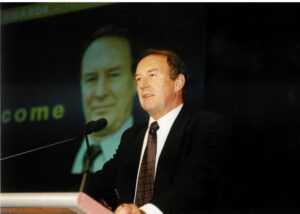
EUPAVE and ASCP – Memorandum of Understanding
On the 15th September 2021, EUPAVE, the European Concrete Paving Association and ASCP signed a Memorandum of Understanding which seeks to “strengthen their relationship and provide mutual support in their missions related to facilitating the advancement of knowledge and technology related to concrete pavements through education, technology transfer and research”. Under this agreement, EUPAVE, the European Concrete Paving Association and ASCP will meet quarterly and “to encourage collaboration and cooperation between the parties, and to avoid technical duplication“. In advance of the signing Stéphane Nicoud (EUPAVE President), Luc Rens , Elise Carabedian, [the late] Kevin Abrams and Justin Moss (ASCP President) refamiliarised each other with some of the unique challenges in our industry and general the relative scale of our various jurisdictions. Of particular note was the realisation how similar each organisation was in terms of membership and operational model (largely volunteer). One of the intial initiatives that EUPAVE, the European Concrete Paving Association and ASCP will work on together is the sharing of the Register of Concrete Pavements Map with EUPAVE to potentially include, in future, mapping and dashboarding information portal access for all European concrete pavements. https://www.eupave.eu/ https://lnkd.in/gipb8imy
David Dash (1943-2021) Honorary ASCP Member, Industry Legend
Vale David Dash. Passed away peacefully 7 August 2021.
David was a brilliant and dedicated engineer whose impact on our industry is impossible to overstate. His tireless and abundant work on technical specifications, test procedures, policy and culture made him one of the most influential roads engineers in our history. Equally effective at detailed design, construction processes and broad policy setting, there is hardly a major road in NSW he did not contribute to during his career which spanned over 50 years. He was technically very astute and professionally committed, both a leader and advocate.
He was a mentor to many.
It is impossible to raise the topics of quarrying, aggregate grading and shape, and paving without hearing his no-nonsense, wise and shrewd words. He was singularly associated with adapting the ‘Shilstone’ method to local practice for combined aggregate gradings and workable paver mixes now widely and successfully used in practice.
Career snapshots
- Commenced in the mid 60s with the Department of Main Roads NSW in country offices at Grafton, Port Macquarie and Bega.
- He spent time in bridge design.
- Supervising Engineer at Blacktown Divisional office in 1984/5, and then Divisional Engineer at Goulburn.
- From 1985 to 1988, in the Australian Bicentennial Road Development Program, contract Superintendent on all major construction work on the Hume and Federal Highways including concrete pavement works.
- In that period conspicuous in many areas contributing to the concrete pavement industry where it is today.
- From 1988 until 1993, Manager of Major Projects Northern Region (Newcastle) including all works on Sydney to Newcastle Freeway and Pacific Highway. One of many challenges met and overcome was successfully constructing concrete pavements through cuttings that exposed coal seams close to active mining areas.
- After Newcastle, RTA’s General Manager Pavements Branch, based in Sydney. In this role he was instrumental in documenting a number of typical cross-sections for both rigid and flexible pavements for use as guides to designers, still in use today.
- After (sort of) retiring from the Department, did he ever actually retire, David was engaged as a consultant to RTA, SMEC and also over a period of about ten years with Arcadis (/Hyder Consulting) where he worked on many major projects.
His expertise was recognised internationally when he was engaged as lead consultant on a new major concrete highway project in Kazakhstan on the old silk route after, which he was dubbed “The New Marco Polo”.
In the Hunter (Newcastle) region of what is now Transport for NSW, annual Staff Awards are given in his name, the “David Dash Award”.
In August 2014 his career contributions to industry were justly recognised when he was made an Honorary (Life) Member of ASCP.
Legends are made, not born. David made himself a legend
Until 20th Aug 2021, tribute messages may be left here – your messages will be compiled into a book and provided to David’s family at an appropriate time.
In lieu of flowers, David’s family has asked that you contribute to the Colong Foundation for Wilderness or the Lung Foundation Australia. ASCP will be making donations to both in his name.
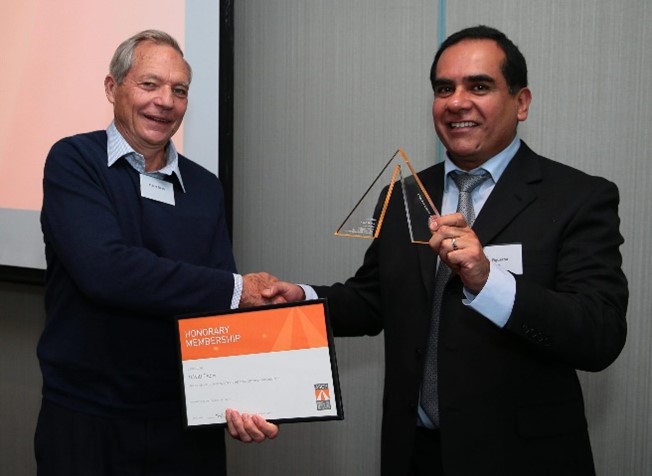
California Measures Long-Term Performance of Rapid Strength Concrete for Pavement Restoration
Results of a Southern California freeway survey that set out to determine the short-term and long-term performance of rapid strength concrete for the potential repair and restoration of highway infrastructure work.
Deteriorating highway and other infrastructure conditions across the U.S., combined with widespread funding shortfalls, make it clear that there is a need for cost-effective, long-term solutions for roadway preservation. Surveys of existing projects in California have addressed this need, with results documenting pavement restoration successes and offering guidance on the practice of pavement management.
The use of rapid strength concrete (RSC) for roadway construction is extremely beneficial for today’s congested highways and the traveling public. Because RSC reaches opening strength in a matter of hours, slab replacement can be accomplished overnight. The California Department of Transportation (Caltrans) has used RSC for pavement repair since the 1990s and is typically able to complete slab replacement—including removal of cracked slabs, repair of the base course, placing of dowel bars and interlayer, and placing and curing of RSC—within a six-hour window. Lanes are typically closed at 11:00 PM and open to traffic again by 5:00 AM.
Benefits of concrete pavements by EUPAVE (2021)
Concrete pavements contribute to a reduction of fuel consumption, are 100% recyclable and do so much more. Watch all benefits of concrete pavements put forward in EUPAVE’s promotional video “Concrete roads to the green world”! Following the publication of its infographic and fact sheets, EUPAVE has updated its promotional video with facts and numbers. The video was initially released during the 13th International Symposium on Concrete Roads in 2018.
ASCP Pavement Note 003 published
Pavement Note 003 “Low Noise Concrete Pavements: Smooth, Safe, Durable And Cost-Effective Texturing (LNDG)“. The Note presents a concise summary of the low noise benefits of concrete pavements. It concludes that…
“Asset owners want a pavement with low initial cost, low maintenance cost, good skid resistance especially in wet weather, good ride quality and low noise . LNDG delivers on every one of these criteria.“
The document is supported by high quality references and graphics. The intended audience is decision makers, funders, engineers and highway technical staff. Please pass this on to colleagues that would benefit from such a concise summary of issues.
ASCP Pavement Note 002 published (in Spanish)
Pavement Note 002 “Sustainable Concrete Pavements: Reduced Environmental Impact Of Concrete Pavements” (Pavimentos De Hormigón Sostenibles: Reducido Impacto Ambiental De Los Pavimentos De Hormigón) is now, thanks for translation by Anefhop, is now available in Spanish. The Note presents a concise summary of the sustainability benefits of concrete pavements. It concludes that…
“Los pavimentos de hormigón causan menor impacto ambiental que los pavimentos asfálticos. Esta nota resume los últimos hallazgos que comparan los aspectos de sostenibilidad de las dos principales opciones de pavimentos para tráfico pesado. A su vez, proporciona a los organismos y a los responsables de la toma de decisiones información para ayudar a cumplir los objetivos de sostenibilidad.“
The document is supported by high quality references and graphics. The intended audience is decision makers, funders, engineers and highway technical staff. Please pass this on to colleagues that would benefit from such a concise summary. of issues.
ASCP Achievements Report 2020
2020 was a challenging year for ASCP with significant downward pressure on training opportunities (typically 45% of revenue) and the inability to conduct our key face-to-face interactive opportunities (Forums). The National Executive (NE) responded to this challenge with the implementation of austerity measures and the delivery of forums and courses online (or socially-distanced). Read the full report attached.

